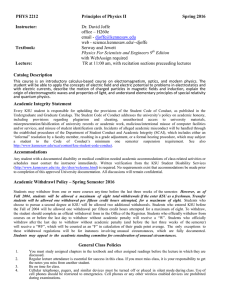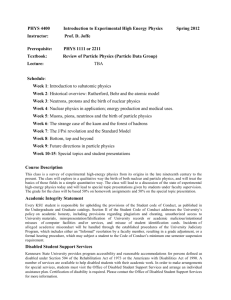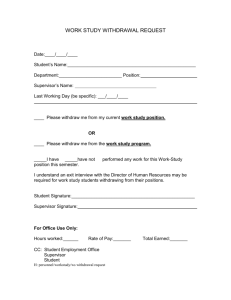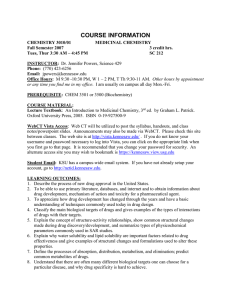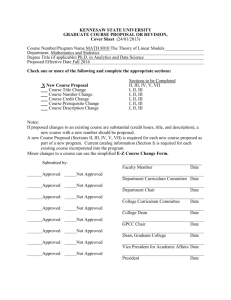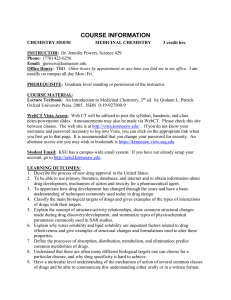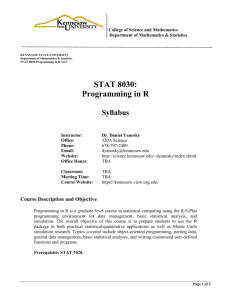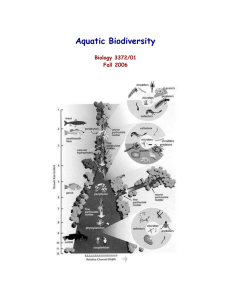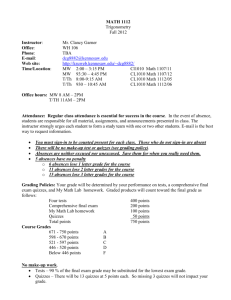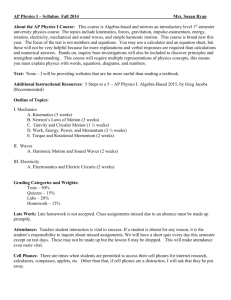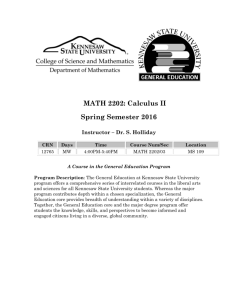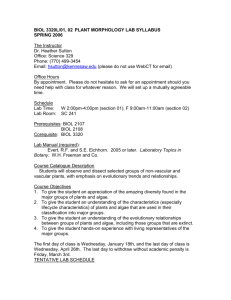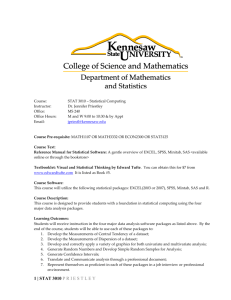SCIENCE 1102: INTEGRATED SCIENCE: Issues in Science
advertisement
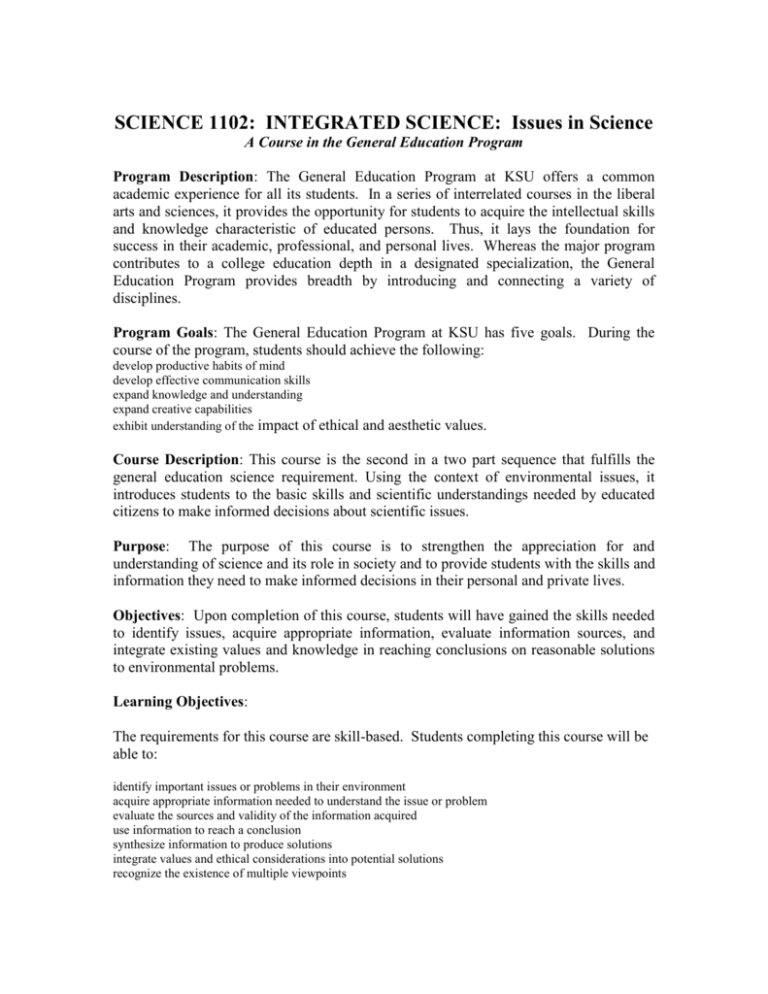
SCIENCE 1102: INTEGRATED SCIENCE: Issues in Science A Course in the General Education Program Program Description: The General Education Program at KSU offers a common academic experience for all its students. In a series of interrelated courses in the liberal arts and sciences, it provides the opportunity for students to acquire the intellectual skills and knowledge characteristic of educated persons. Thus, it lays the foundation for success in their academic, professional, and personal lives. Whereas the major program contributes to a college education depth in a designated specialization, the General Education Program provides breadth by introducing and connecting a variety of disciplines. Program Goals: The General Education Program at KSU has five goals. During the course of the program, students should achieve the following: develop productive habits of mind develop effective communication skills expand knowledge and understanding expand creative capabilities exhibit understanding of the impact of ethical and aesthetic values. Course Description: This course is the second in a two part sequence that fulfills the general education science requirement. Using the context of environmental issues, it introduces students to the basic skills and scientific understandings needed by educated citizens to make informed decisions about scientific issues. Purpose: The purpose of this course is to strengthen the appreciation for and understanding of science and its role in society and to provide students with the skills and information they need to make informed decisions in their personal and private lives. Objectives: Upon completion of this course, students will have gained the skills needed to identify issues, acquire appropriate information, evaluate information sources, and integrate existing values and knowledge in reaching conclusions on reasonable solutions to environmental problems. Learning Objectives: The requirements for this course are skill-based. Students completing this course will be able to: identify important issues or problems in their environment acquire appropriate information needed to understand the issue or problem evaluate the sources and validity of the information acquired use information to reach a conclusion synthesize information to produce solutions integrate values and ethical considerations into potential solutions recognize the existence of multiple viewpoints SCI 1102/10 Interdisciplinary Science: Issues in Science FALL 2004 SYLLABUS INSTRUCTOR Dr. Heather Sutton Office:Science 329 Phone: (770) 499-3454 E-mail: hsutton@kennesaw.edu Web CT site: http://courses.kennesaw.edu SCHEDULE Class Time: TTH 2:00-3:15 Class Room: CL 1008 The first day of class is Tuesday August 24, and the last day of class is Thursday, December 9. The last day to withdraw without academic penalty is Monday, October 18. OFFICE HOURS By appointment. Please do not hesitate to ask for an appointment should you need help with class for whatever reason. We will set up a mutually agreeable time. COURSE DESCRIPTION Prerequisite: SCI 1101 or its equivalent This course is the second in a two-part sequence that fulfills the general education science requirement. Using the context of environmental issues, it introduces students to the basic skills and scientific understandings needed by educated citizens to make informed decisions about scientific issues. TEXT Cunningham, W.P., and M. Cunningham. 2004. Principles of Environmental Science. Inquiry and Applications. McGraw-Hill. Overall course website (for all SCI 1102 sections): http://www.kennesaw.edu/genedweb/courses/sci1101-1102/index.htm EVALUATION AND GRADING 3 tests (20% each) 1 final exam group discussions/activities poster presentation 60% 25% 5% 10% 100% A > 90% B > 80% C > 70% D > 60% F < 60% TESTS AND EXAMS Three tests will be given during the semester. There will be no makeup tests in this course. In instances of severe illness, death in the family, or similar extreme circumstances, the instructor must be notified within 24hrs of the test, and a signed doctors excuse or other valid verification must be produced. Once verification is confirmed, the percent correct on the final exam will be substituted for the percent correct on the missed test. Do not assume that because you have left a message on my voice mail that your excuse is acceptable. Traffic problems are not an acceptable excuse… we all know Atlanta experiences bad traffic delays… so leave early on test days! In the following schedule, all test dates are tentative except for the final exam. There will be no early or makeup final exams. If you know that you cannot be here for the final exam on the time and date below, you should switch to another section. The final exam is cumulative. Test 1 September 23 Test 2 October 26 Test 3 November 30 Final Exam Thursday, December 16, 2:00PM – 4:00 PM The final exam is cumulative. If school is cancelled the day of a test or the class day before a test, the test will be postponed one class period. GROUP DISCUSSIONS/ACTIVITIES At intervals there will be short group activities or discussions to be completed in class. These are listed on the tentative schedule and on the WebCT calendar, however often the class gets off-schedule and so the activities may end up on a different day. Due to this, your group discussion/activity grade will also in essence be an “attendance” grade as well. There will be no makeup group discussions/activities. GROUP PROJECTS The class will divide into groups for a major project presentation on an environmental issue that is currently relevant to Metropolitan Atlanta and/or the North Georgia region. Presentations will be given in a poster format during the last three class periods. All members of a group will receive the same grade. Students who were absent for the presentation without a valid excuse and/or did not participate in preparing for the presentation will receive a zero. Topics will be due October 21. More information will be given later in the semester. EXTRA CREDIT Opportunities for extra credit may arise during the semester. The extra credit will consist of attending a seminar and writing up a report on it. ONLY reports from seminars announced by me in class as being appropriate will be accepted. If you know in advance of a possible seminar, let me know so I can announce it to the class. The seminar must have a theme related to the course. A list below gives some of the seminars that have been scheduled that will be acceptable. Alternatively, you may visit a science-related site such as the Fernbank Science Museum, the Fernbank Science Center, the Atlanta Botanical Garden, the Atlanta Zoo, the Southface Institute, or the Chattanooga Aquarium, and write up a report on what you learned from the experience. A ticket stub or other proof of visit must be attached. There will be a limit of 2 reports per student. Each report can earn up to 1% on your final grade. Reports are due a week after the seminar or site visit. Enplas Seminars (held in SC109) Date Time Speaker Sept 16 12:30-1:30 Russell Allen Oct 12 12:30-1:30 Binghe Wang Nov 18 12:30-1:30 Peter Lawler Topic Biosciences Industry in GA Drug Discovery Bioethics All written assignments, including exams, must be easily legible. In addition, please organize answers appropriately and use correct spelling and grammar. If your answers are incoherent, I can only assume you do not understand the material and you will lose points. ATTENDANCE Class attendance is highly encouraged. Much of the material for the tests and exam will come from lectures. Not all of this material will be in the text. If you miss a class it is up to you to obtain lecture notes from fellow students, I will not make these available. I will however generally have extra handouts that it is your responsibility to ask for. It is also up to you to find out about any important announcements you may have missed. See also the paragraph on group discussions/activities. RECYCLING One of the objectives of this course is to teach you how you can become a more environmentally responsible citizen. To that end, please begin by properly using the recycling facilities that we have on campus. In most hallways of most buildings, including in the area outside of this classroom, there are cabinets in which you can recycle paper, aluminum, and plastic. Please use these! Also, try to reduce your use of paper by using both sides when possible. COURSE POLICY CHANGES Changes in any policies listed in this syllabus will be announced at least a week in advance of the change taking place, and will be announced in class and in a written handout. CLASSROOM BEHAVIOR This is a large class. Your behavior in class will affect the ability of other students to listen and learn. To this end, talking will not be tolerated in class, and repeat offenders will be asked to leave. If you feel like chatting with your neighbor you can do so outside in the hall. Also please put cell phones and pagers on silent mode. Do not however let these rules hold you back from raising your hand to answer questions, ask questions, or initiate discussion. Class participation is encouraged!! PLAGIARISM I intend to adhere strictly to the university policy on plagiarism and cheating. Anyone caught cheating or plagiarizing will receive a zero on that assignment or test. Further disciplinary action may be initiated. Kennesaw State University Policy on Plagiarism and Cheating No student shall receive, attempt to receive, knowingly give or attempt to give unauthorized assistance in the preparation of any work to be submitted for credit as part of a course (including examinations, laboratory reports, essays, themes, term papers, etc.). When direct quotations are used, they should be indicated, and when the ideas, theories, data, figures, graphs, programs, electronic based information or illustrations of someone other than the student are incorporated into a paper or used in a project, they should be duly acknowledged. NEW ACADEMIC WITHDRAWAL POLICY EFFECTIVE FALL SEMESTER 2004 Students may withdraw from one or more courses anytime before the last three weeks of the semester. However, as of Fall 2004, students will be allowed a maximum of eight total withdrawals if the enter KSU as a freshman. Transfer students will be allowed one withdrawal per fifteen credit hours attempted, for a maximum of eight. Students who choose to pursue a second degree at KSU will be allowed two additional withdrawals. Students who entered KSU before the Fall of 2004 will be allowed one withdrawal per fifteen credit hours attempted for a maximum of eight. To withdraw, the student should complete an official withdrawal form in the Office of the Registrar. Students who officially withdraw from courses on or before the last day to withdraw without academic penalty will receive a “W”. Students who officially withdraw after the last day to withdraw without academic penalty (and before the last three weeks of the semester) will receive a “WF”, which will be counted as an “F” in calculation of their grade point average. The only exceptions to these withdrawal regulations will be for instances involving unusual circumstances, which are fully documented. Students may appeal to the academic standing committee for consideration of unusual circumstances. LAST DATE TO WITHDRAW WITHOUT ACADEMIC PENALTY FALL 2004 October 18, 2004 Academic Integrity Every KSU student is responsible for upholding the provisions of the Student code of Conduct, as published in the Undergraduate and Graduate catalogs. Section II of the Student Code of Conduct addresses the University’s policy on academic honesty, including provisions regarding plagiarism and cheating, unauthorized access to University materials, misrepresentation/falsification of University records or academic malicious/intentional misuses of computer facilities and/or services, and misuse of student identification cards. Incidents of alleged academic misconduct will be handled through the established procedures of the University Judiciary Program, which includes either an “Informal” resolution by a faculty member, resulting in a grade adjustment, or a formal hearing procedure, which may subject a student to the Code of Conduct’s minimum one semester suspension requirement.
